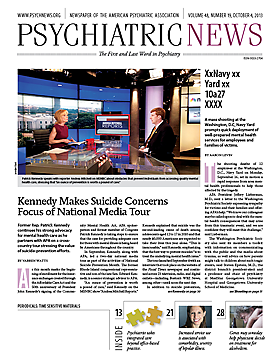Question: When is a note from the doctor a federal case?
Answer: When it serves to support a patient’s claim for reasonable accommodation at work under the Americans With Disabilities Act (ADA).
This summer, the U.S. Equal Employment Opportunity Commission (EEOC) issued a fact sheet explaining what mental health care providers can do when patients request their help on this ADA issue.
“Reasonable accommodation” means some change in the usual way work is performed “that enables an individual to do a job, apply for a job, or enjoy equal access to a job’s benefits and privileges,” according to the fact sheet.
And the psychiatrist’s role involves more than writing a note to the employer reporting on a diagnosis or treatment, said Colleen Coyle, J.D., APA’s general counsel.
“The doctor must understand the essential responsibilities of the person’s job and what, if any, disabilities affect performing that job,” Coyle told Psychiatric News.
The ADA looks at patients “in their native state,” as if they were untreated, to determine the existence of a disability and the need for accommodation, said Coyle. For instance, a patient may have difficulty paying attention for long periods of time and has a job stocking shelves: Does that symptom affect job performance? The two must relate.
The disability need not be extreme, according to the EEOC, just substantially limiting, meaning something that makes work activities “more difficult, uncomfortable, or time-consuming,” compared with what most people experience. The EEOC was silent on what degree of difficulty, discomfort, or timing would be “substantially limiting,” however.
Accommodation must be “reasonable” and not cause “significant financial or operational difficulty” to the employer. That might include (but not be limited to) time off work for the employee to receive treatment (to be made up later), modified work schedules, or changes in supervision such as providing written rather than oral instructions to the employee.
The psychiatrist needs the patient’s permission to write to or talk with the employer, said Coyle. Information disclosed should concern only the matter of the disability and possible accommodation, because legal and ethical standards of patient confidentiality remain in place.
Upon the patient’s request, the psychiatrist should discuss with the patient the nature of the job and suggest possible accommodations that would be sufficient to get work done. The psychiatrist’s proposed accommodation is still just a suggestion, however. The employer and the patient may be able to arrange for an alternative that accomplishes the same goals, if they choose.
Documentation—in plain language—should describe the following factors, according to the EEOC:
The clinician’s professional qualifications and nature and length of the relationship with the patient.
The patient’s functional limitations in the absence of treatment.
The need for reasonable accommodation.
Suggested accommodations for the disability.
But that’s not all, said Coyle.
“Show the patient the letter you’re sending to the employer and get them to OK it,” she said. “You don’t want to recommend something the patient is unwilling to do or that would inhibit the patient from doing the job.”
The clinician must strike a balance. If the bar is set too high for the patient’s abilities and he or she cannot complete the tasks agreed to, or will not accept the reasonable accommodation offered, then the employer may have the right to terminate the employee, Coyle said.
Finally, while on the subject, psychiatrists might also take this moment to consider how well their own clinic settings and procedures accommodate patients and others with disabilities, Coyle added. ■
